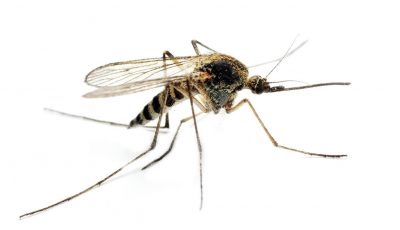By Philip R. Fischer, MD, DTM&H
Synopsis: Partial resistance to artesunate was seen in 11% of young children hospitalized with complicated malaria, mostly due to the Pfkelch13 A675V genetic variation. Affected children demonstrated delayed initial parasite clearance and then suboptimal efficacy 28 days following initiation of treatment with parenteral artesunate followed by oral artemether-lumefantrine.
Source: Henrici RC, Namazzi R, Lima-Cooper G, et al. Artemisinin partial resistance in Ugandan children with complicated malaria. JAMA 2024; Nov 14:e2422343. doi: 10.1001/jama.2024.22343. [Online ahead of print].
Plasmodium falciparum malaria still causes more than half a million deaths each year. However, variations in the Pfkelch13 gene cause resistance to artesunate and have been found in children with uncomplicated malaria in eastern Africa. Henrici and colleagues evaluated the effectiveness of artesunate and variations in malaria genes in Ugandan children hospitalized with complicated bouts of malaria.
A prospective study in 2021 to 2022 in Jinja, Uganda, involved 100 children aged 6 months to 12 years (mean, 3.7 years) with fever, P. falciparum on microscopic examination of blood, and illness severe enough to require hospitalization. Standard treatment with initial parenteral artesunate followed by oral artemether-lumefantrine was provided.
Artemisinin partial resistance (defined as a parasite clearance rate half-time of greater than five hours) was found in 11 of 100 children. The parasites from 10 children had variations in the Pfkelch13 gene — eight with the A675V variation and two with the C4692Y variation. With the A675V variation, the half-time to parasite clearance was 4.9 hours vs. 3.2 hours in those with the wild-type Pfkelch13 gene. Among children with the A675V variation, 38% had partial resistance, as compared to 9% of those with a wild-type Pfkelch13 gene (P = 0.04). Recrudescence of malaria within 28 days was seen in 13 children and was unrelated to Pfkelch13 gene variations.
The authors of this paper expressed concern about the frequency of partial artemisinin resistance (mostly related to the Pfkelch13 gene variation A675V) and the frequency of recrudescence (although unrelated to Pfkelch13 gene variations). If such resistance and recrudescence are found to be spreading geographically or increasing in frequency, the current recommendations for artemisinin combination therapy might need to be modified.
Commentary
The availability of pediatric malaria vaccines in Africa is helpful, but vaccine efficacy is limited.1 Thus, ongoing highly effective anti-malaria medications are necessary.1 Artemisinin combination therapy is the current standard for treating P. falciparum infections. It uses an artemisinin, which has a short half-life but causes a marked reduction in the degree of parasitemia (examples include artesunate [initially given parenterally for severely sick patients] and artemether [used orally for patients with uncomplicated malaria]) along with a longer-acting antimalarial agent, such as lumefantrine, that provides lasting parasite clearance.1
Partial artemisinin resistance is characterized by delayed clearance of malaria parasites from the blood and is common in much of Asia, having first been identified there in 2008, and has been identified in East Africa.1,2 This resistance often is due to allelic variations in the parasite’s Pfkelch13 genes.1 However, the specific alterations in Pfkelch13 genes vary between countries.2 Many (27%) of the patients with delayed parasite clearance in the new study summarized earlier had the Pfkelch13 gene’s A675V variation identified.
There are ongoing efforts to develop new anti-malaria medications, but it likely will be years before such agents are available.2 Computational tools and computer-aided drug design are being leveraged to help expedite the development of new effective malarial medications.3
What medications are in development? Ganaplacide is a potent, rapidly acting medication that potentially could replace artemisinins, in combination with lumefantrine, to treat malaria; Phase II trials have been completed, and a Phase III trial is underway for patients with uncomplicated malaria.1 Cipargamin acts in similarly rapid fashion and also could be combined with a long-acting agent such as lumefantrine; Phase II trials for patients with severe malaria are underway.2 More than a dozen other medications currently are undergoing pre-clinical, Phase I, and Phase II evaluation.1
There also are various forms of chemoprophylaxis for malaria that can be given either seasonally in areas where malaria is seasonal or intermittently (perennially) for young children and pregnant women in areas of year-round transmission.1 Sulfadoxine-pyrimethamine is effective with these sorts of prophylactic treatment.1
Philip R. Fischer, MD, DTM&H, is Professor of Pediatrics, Department of Pediatric and Adolescent Medicine, Mayo Clinic, Rochester, MN.
References
1. Okombo J, Fidock DA. Towards next-generation treatment options to combat Plasmodium falciparum malaria. Nat Rev Microbiol 2024;Oct 4. doi: 10.1038/s41579-024-01099-x. [Online ahead of print].
2. Rosenthal PJ. Artemisinin partial resistance and the treatment of severe malaria. JAMA 2024;Nov 14. doi: 10.1001/jama.2024.23100. [Online ahead of print].
3. Ncube NB, Tukulula M, Govender KG. Leveraging computational tools to combat malaria: Assessment and development of new therapeutics. J Cheminform 2024;16:50.
Partial resistance to artesunate was seen in 11% of young children hospitalized with complicated malaria, mostly due to the Pfkelch13 A675V genetic variation. Affected children demonstrated delayed initial parasite clearance and then suboptimal efficacy 28 days following initiation of treatment with parenteral artesunate followed by oral artemether-lumefantrine.
Subscribe Now for Access
You have reached your article limit for the month. We hope you found our articles both enjoyable and insightful. For information on new subscriptions, product trials, alternative billing arrangements or group and site discounts please call 800-688-2421. We look forward to having you as a long-term member of the Relias Media community.

